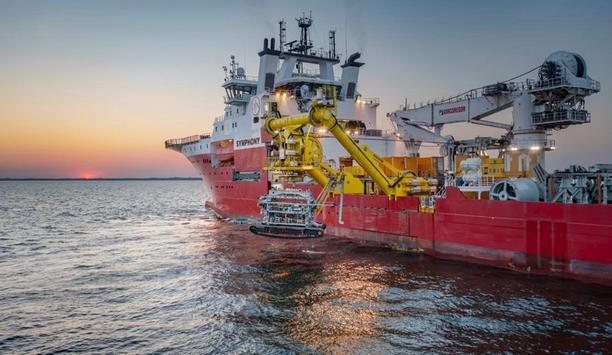Jan De Nul Group - Experts & Thought Leaders
Latest Jan De Nul Group news & announcements
After winning a 3-year contract for more than 80 vessels to VSAT, Iridium, and VoIP in 2021, Castor Marine’s connectivity contract has been renewed by Jan De Nul Group and includes a roll-out of Starlink to most Jan De Nul Group vessels. The experts in marine construction, civil engineering, and environmental projects have expressed their continued satisfaction with and need for solid vessel connectivity on a global scale. Hybrid LEO GEO service With the addition of Starlink, the Castor Marine provided hybrid LEO GEO service is a leap forward in terms of internet speed and latency, bringing significant benefits in terms of both crew welfare and business operations for Jan De Nul Group. The installation and service contract not only comprises the VSAT, Starlink, Iridium, and VoIP, but also the necessary hardware and 24/7 support services for the globally active fleet. Flexible and fast response times Nils Crabeel, Vessel Communication Manager at Jan De Nul Group, says, "In the past three years we’ve seen that Castor Marine delivers on its promises, which is important in building mutual trust and, of course, in daily practice where Jan De Nul regularly needs temporary project upgrades and downgrades on its vessels." Nils Crabeel adds, "We are happy with their support services. From the support desk to installation works, Castor Marine’s account management is one of the short lines of communications, flexible and fast response times.” Tailored solutions Castor Marine delivers tailored connectivity solutions, with quality of services specified in detail Castor Marine delivers tailored connectivity solutions, with quality of services specified in detail, right down to Jan De Nul Group’s VLAN level requirements. In the past three years, the fleet has experienced Castor Marine’s operational and commercial flexibility in providing its global VSAT network. This makes scaling up easy, a useful feat, as every single vessel can have ad hoc, dedicated high bandwidth demands on short notice. High-bandwidth airtime solutions Mark Olthuis, Director of Maritime Offshore & Energy at Castor Marine, says, “We are thankful for Jan De Nul’s continued trust. As a VSAT Network Operator and Authorised Starlink Reseller, we are proud that our flexible, high-bandwidth airtime solutions match the expectations of the Jan De Nul Group and its fleet." Mark Olthuis adds, "Castor Marine is committed to providing the best possible mix of LEO and GEO connectivity services to Jan de Nul by anticipating new technologies coming available.”
DNV and 14 partners have concluded phase 1 of the Emission Reduction (EMRED) Joint Industry Project (JIP), developing a monitoring and reporting framework to quantitively assess greenhouse emissions (GHG) from the offshore wind segment. In November, phase 2 of the project will entail testing the framework by including more offshore vessel types and gathering more data. Operational modes As the offshore industry is looking to decarbonise, DNV and partners including RWE, Vattenfall, Ørsted, Scottish Power Renewables, DEME, Cadeler, Jan De Nul Group, Ziton, Van Oord, Heerema, GustoMSC, Maersk Supply Service, Atheloen and Fred. Olsen Windcarrier has, in phase 1, agreed on a framework for foundation installation, wind turbine installation, and cable laying vessels. With clearly defined operational modes and reporting parameters, the EMRED JIP aims to standardise decarbonisation reporting and increase transparency within the industry. The framework will now be tested through phase 2, expanding the project to include various vessel types The framework will now be tested through phase 2, expanding the project to include various vessel types related to the offshore segment. Phase 2 invites companies involved with platform supply vessels (PSV), anchor handling tug supply vessels (AHTS), standby vessels, service operation vessels, crew service operation vessels (SOV/CSOV), and subsea support vessels to participate. Decarbonise the offshore segment Arnstein Eknes, Segment Director for Special Ships, DNV said: “Partners of the EMRED JIP are collaborating to improve transparency, defining how emissions and associated service work can be reported for offshore vessels. To decarbonise the offshore segment, we as an industry, need deeper insight of operational modes and where measures will have the highest impact for a field developer or field operator." "The inclusion of these diverse vessel types will provide a broader representation of the offshore sector and contribute to standardising data reporting. As the industry faces a need to decarbonise in alignment with multiple stakeholder ambitions, we aim to make emissions reporting more accessible and transparent which also stimulate our industry efficiency.” Collaboration and commitment Ørsted is thrilled to be an active participant in our joint industry partnership dedicated" Peter Staal, Lead PL QHSE Manager, Ørsted said: “Ørsted is thrilled to be an active participant in our joint industry partnership dedicated to creating an emission baseline for the logistical industry. It's inspiring to witness the collaboration and commitment from diverse stakeholders working towards a sustainable future." "By collectively establishing these crucial benchmarks, we are not only fostering transparency but also paving the way for innovative solutions that will undoubtedly drive positive change in our industry.” Reduce GHG emission Jan Schanke-Jørgensen, COO, Fred. Olsen Windcarrier said: “It is positive and inspiring that the offshore industry takes the challenges in GHG emission recording and establishment of baseline activities into a forum where not only the industry itself can benefit but also the authorities like IMO and EU can be guided on the framework needed in the future to reduce GHG emission." "Rules like CII is expected to be introduced to the offshore segment, and we might just be at the helm of the process, getting a system that works for the industry.”
The second North Sea Summit which is being organised by the Belgian Federal Government will have an important industrial outlook since it will be supported by seven Belgian companies and federations. These are the system operators Fluxys and Elia, the hydraulic engineering specialists DEME and Jan De Nul, the Belgian Offshore Platform, the Belgian employers' association for technology companies Agoria, and the Port Oostende. North Sea Summit They will be welcoming the CEOs of 100 top European companies that work in the field of offshore renewable energy on Monday 24 April 2023. During two roundtable discussions, they will join national and European policymakers to discuss the future of the North Sea. The largest coalition ever focusing on energy in the North Sea The European offshore sector can strengthen its position and contribute to a sustainable energy system The North Sea Summit in Ostend will follow in the footsteps of the May 2022 North Sea Summit held in Esbjerg, Denmark, and will aim to make the North Sea the new green power hub of Europe. By working together, accelerating, and focusing on innovation, the European offshore sector can strengthen its leading position across the world and more quickly contribute to the establishment of a more sustainable, affordable, and independent energy system. Addressing energy challenges Following a suggestion from the Belgian Federal Government, the number of countries that were involved in the summit in 2022 is being expanded from 4 (Belgium, the Netherlands, Germany, and Denmark) to 9 (UK, Ireland, France, Norway, and Luxembourg). Along with experts from the offshore industry, the largest coalition ever focusing on energy in the North Sea will thus gather together in Ostend. Discussions with 100 European industry front-runners The North Sea Summit in Ostend will host national and European politicians and, in line with the Belgian Federal Government’s recommendations, 100 CEOs from large industrial companies. The entire offshore renewable energy value chain will therefore be represented at the summit. Guests will include representatives from wind farm developers and investors; representatives from manufacturers of wind turbines, electrolysers, foundations, and other related components; EPC contractors; ship operators; ports; and transmission system operators. The latter are all essential for the building, integration, and operation of offshore renewable energy technology. Political and an industry strand At the start of the conference, a roundtable discussion will be held, which the energy ministers will attend The North Sea Summit will include two strands: a political strand and an industry strand. Representatives from the industry will be hosted at their separate locations. Political leaders will join them at two different points during the day. At the start of the conference, a roundtable discussion will be held, which the energy ministers will attend alongside European Commissioner Kadri Simson. Green hydrogen Additionally, towards the end of the day, the heads of state and governments and Ursula von der Leyen, the President of the European Commission, will join industry representatives for the second time. Together, they will take part in discussions related to supply chains and competitiveness, enhanced European cooperation, grid infrastructure investments, innovation, and the acceleration of offshore renewable energy deployment. Building on the previous summit in Esbjerg, the expansion of green hydrogen will also be discussed. 7 Belgian partners In terms of the timetable for representatives from European industry, the Belgian Government established a partnership with 7 Belgian companies and federations that are making a significant mark on the development of offshore renewable energy in the North Sea and beyond. Their representatives will therefore have a prominent voice during the roundtable discussions. Ports Ports are essential nodes in the supply chains of the offshore wind turbine industry" "Ports are essential nodes in the supply chains of the offshore wind turbine industry," Dirk Declerck, CEO of Port Oostende. "Ports which are key contributors to the diversification of our energy supply and the acceleration of renewable energy should be appropriately recognised and be part of the European transport infrastructure network." Offshore grid “The North Sea will become the engine of Europe’s economy. This will only succeed if we develop the necessary infrastructure for it, which will look different compared with today." "The future offshore grid needs innovations such as hybrid interconnectors (interconnectors that are linked to wind farms) and energy hubs such as the first artificial island we are building in the Belgian North Sea," Chris Peeters, CEO of Elia Group. Electrification and hydrogen system "A balanced system of electrification and hydrogen in the North Sea is the way forward. Hydrogen can also be stored to secure our energy supply in the medium to long term." "In addition, carbon removal technologies are needed to capture unavoidable emissions from industrial processes. The North Sea has many depleted oil and gas reservoirs and aquifers that can be used for the permanent storage of CO2," Pascal De Buck, CEO of Fluxys. Renewable energy The industry is ready to convert as much North Sea wind as possible into renewable energy" "Industry is ready to convert as much North Sea wind as possible into renewable energy for citizens and businesses. We ask the heads of state and governments and the President of the European Commission to accelerate their work on a robust legal framework." "This is necessary to attract investments in the production, transport, and storage of North Sea energy," Annemie Vermeylen, Secretary-general Belgian Offshore Platform. Energy transition "By combining our knowledge, expertise, and ambitions, we as the Belgian and European offshore industry can take on a leading role in accelerating the energy transition, boosting energy security, anchoring the industry in Europe, and strengthening the European lead in offshore technology." "To be successful in this, however, it is important to address urgent needs around the supply chain, human resources, and capacity to successfully realise these ambitions," Bart Steukers, CEO of Agoria. Supply chain "As we face geopolitical instability, the offshore energy sector needs a long-term stable investment environment. We are pioneers and world leaders in our sector, but the European supply chain (wind farm components, installation vessels, etc.) needs to be strengthened so that we have a guaranteed supply of parts at competitive prices." "It is also essential to have a sound compensation mechanism for offshore wind farms that protects both consumers and the supply chain," Julie De Nul, CEO of Jan De Nul Group. Innovative solutions The European offshore energy sector has the know-how and capabilities to help realise the energy transition" “The European offshore energy sector has the know-how and capabilities to help realise the energy transition, make Europe more energy independent, and anchor these activities in Europe." "DEME is a prime example of this and is extremely well positioned to continue providing the innovative solutions needed for this green future. This North Sea Summit is important for highlighting the opportunities, but also the challenges and the framework conditions that need to be addressed to achieve these goals," Luc Vandenbulcke, CEO of DEME Group. Overview of European industry and federations participating in Ostend For Belgium Port Oostende, John Cockerill, DEME, Jan De Nul, Besix, Smulders, Sibelco, Parkwind, Fluxys, Elia, ArcelorMittal, Solvay, Ackermans & van Haaren, North Sea Port, Port of Antwerp-Bruges, Agoria, Belgian Offshore Platform, Virya, and Otary For Denmark Vestas, NKT Group, Ørsted, Energinet, Copenhagen Infrastructure Partners, Port of Esbjerg, Green Power Denmark, Haldor Topsoe, Maersk, Dansk Industri, Dansk Erhverv, Danske Rederier and DSV. For France Nexans, Chantiers de l’Atlantique, Louis Dreyfus Armateurs, Eiffage, Port du Havre, Alstom, Engie, EDF, TotalEnergies, RTE, GRTgaz, EVOLEN, France Énergie Éolienne, McPhy, Port de Saint-Nazaire and Port de Dunkerque. For Germany Linde, Siemens Gamesa, RWE, OGE, GASCADE, 50Hertz, Amprion, BASF, ThyssenKrupp, BWO, EnBW, Iberdrola Germany and KfW. For Ireland XOCEAN, Electricity Supply Board, Mainstream Renewable Power, Simply Blue Group, SuperNode, MaresConnect, EirGrid, Enterprise Ireland, Temporis, and Wind Energy Ireland. For The Netherlands NWEA, IRO, Van Oord, Sif, TenneT, Gasunie, Port of Rotterdam, Eneco, GBM Works and Huisman. For Norway Aibel, Fred. Olsen Windcarrier, Aker Solutions, Equinor, Statkraft, Statnett, NVE, DNV, NorSea/ Wilhelmsen and Norge Mining. For the UK Shell, BP, SSE, National Grid Ventures, ScottishPower, Associated British Ports, Energy UK, Renewables UK, Catalyst Technologies, The Crown Estate, National Gas, and INEOS. European associations WindEurope, Clean Hydrogen Partnership, European Sea Ports Organisation, Europacable, EIB, WWF, and Renewables Grid Initiative.




